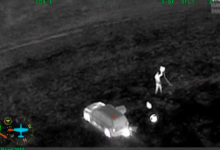Saskatoon mother believes son died participating in online challenge

Cash Anderson was a vivacious 13-year-old boy. His mom, Melanie, said he would wake up early all the time to get outside and skateboard, and he always had to make sure his fiery red curls were sitting just right before school.
Toronto to fund new mental health crisis teams to replace police during some 911 calls
“He was just always a busy kid, and was since the day he was born,” Melanie said.
“He was always just doing his thing, playing music, [a] really happy kid.”
On Feb. 6, she and Cash were home. She heard some noises in his room that she said were strange, but said Cash had really been trying to be independent lately and wanted more privacy, so she left it alone.
She went upstairs about an hour later to check on him. She said it was pretty dark up there and she didn’t see him in his bed.
“Then when I looked over, I thought, ‘Oh, well that’s ridiculous, he’s fallen asleep in his closet. What a strange kid,'” she said. “Then when I turned the lights on, I realized what I was dealing with. … I knew there was nothing we could do and we phoned 911 and just started our new sweet journey of hell.”

Melanie is adamant that Cash did not die by suicide, based on the position in which she found his body and that he seemed happy, open and engaged in life.
After speaking with first responders and searching online, Melanie came to the conclusion that her son had likely been participating in an online challenge where kids will make themselves pass out and then experience a kind of high when they wake up.
She said the family doesn’t know if Cash had been recording, as they haven’t been able to access his phone.
Dr. Tamara Hinz, a child and adolescent psychiatrist in Saskatoon, said everyone is susceptible to trends.
“That feeling is particularly strong among kids and teenagers when a large part of our identity formation relies on our peers and our friend groups,” she said.
The online age allows for dangerous trends to spread more quickly, Hinz said.
“When you couple that with sometimes feelings of invincibility that kids sometimes experience … then you can have these extremely tragic but unintended consequences,” she said.
“I think parents are in a very difficult position. It’s a very tricky balance to find between giving your children developmentally appropriate freedom and privacy, while also making sure that you’re able to observe and monitor, particularly online behaviour.”
Melanie said she wished she would have had a parental app on Cash’s phone to monitor what apps he was spending time on. Such controls can also give the parent the ability to block their child from searching certain things.
She said she used to have time limits on his phone because she wanted him to get outside and do some activities every once in a while and not just sit on his phone. But with the COVID-19 pandemic she wanted to balance that with the knowing that Cash’s phone was one of his only connections to his friends.
“He felt like he wanted to know first-hand everything about everything that was out there. He wanted to grow up quickly. He wanted to know it all,” Melanie said.








Redes Sociais - Comentários